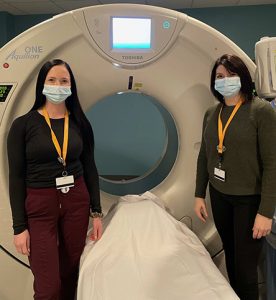Computed tomography (CT Scan)
MI-PCS-007 v4 CT Virtual Colonography Patient Preparations REVISED May 2023 (PDF)What we do

Computed tomography (CT) is performed by specially trained CT technologists. With CT imaging, multiple images of the body are taken. The simplest explanation of this technology is to imagine that your body is like a loaf of bread. This loaf has many slices to it and a CT scan allows us to look at each slice in great detail.
Images are taken at specific intervals and are used to create two-dimensional images of soft tissues and other structures not captured in conventional X-rays. Three-dimensional (3-D) images can be produced in some cases, depending on the type of equipment and computer software available.
CT scans may be taken of any area of the body including the head, neck, chest, abdomen, pelvis, legs, and arms. CT scans are particularly useful in diagnostic analysis of organs, bones, musculoskeletal disorders, cardiovascular disease, infectious diseases, and cancer.
What patients can expect
The CT machine is a large piece of equipment with a hole in the centre for the body to pass through. The CT technologist will position you on the table. The table will slide in and out of the centre hole of the CT machine. The machine rotates around your body to take images and makes clicking and loud noises as it moves.
To avoid blurred pictures, you must remain still during the procedure while imaging takes place. You may be asked to hold your breath during the procedure. This will be explained to you by the technologist.
Contrast solution (dye) is sometimes required to assist the technologist/radiologist in visualizing required body structures. Contrast solution can be given by mouth, by injection, or sometimes both. If you receive a dye injection during the scan, you may get a warm flushed feeling that will pass in a minute or so. The technologist will be in the next room during the scan but will watch you closely and be able to talk back and forth with you.
Special precautions are taken for patients with allergies, diabetics, children and patients taking certain medications.
On occasion, children may require mild sedation or even general anesthesia and must be accompanied by a parent or guardian.
Locations that offer this service
| Burin Peninsula Health Care Centre | Appointments – 709-891-3408 8:00 a.m. – 4:00 p.m. Monday to Friday |
| Carbonear General Hospital | Appointments – 709-945-5127 7:30 a.m. – 7:00 p.m. Monday to Friday |
| Dr. G.B. Cross Memorial Hospital | Appointments – 709-466-5240 8:00 a.m. – 4:00 p.m. Monday to Friday |
| Health Sciences Centre (HSC) | Appointments – 709-777-9729 7:00 a.m. – 10:00 p.m. Monday to Friday |
| Janeway Children’s Health and Rehabilitation Centre |
Appointments – 709-777-4266 7:00 a.m. – 10:00 p.m. Monday to Friday |
| St. Clare’s Mercy Hospital | Appointments – 709-777-9729 7:00 a.m. – 10:00 p.m. Monday to Friday |
Please note: Patients are notified by telephone and/or appointment letter for all services that require an appointment.
How to prepare
Preparation for the CT scan varies depending on the area being examined. Please ensure you read all the patient preparation instructions on your appointment letter.
Scans that include the abdomen and/or pelvis may require you to drink two large glasses of liquid dye (oral contrast) about one hour before the scan. The technologist will explain this process when you come to the hospital.
You may also have to fast the night before your examination. Instructions for preparation will be included in your appointment letter. The doctor who ordered your examination may also give you information about the required preparation.
- If you are a diabetic, your insulin or blood sugar pills may need to be adjusted. If you are taking medications called Metformin or Glucophage, these may also have to be adjusted. Please discuss this with your doctor before your appointment.
- If you are taking any other medications, continue these as usual with a small sip of water.
- If you could be pregnant or are breastfeeding, please discuss it with your doctor before your appointment. Your scan may need to be booked at a later date.
- Please bring a list of your current medications with you to the appointment.
Test results
Your examination will be reported by a radiologist or nuclear medicine physician and sent to your doctor within 15 business days.
Please check with your doctor’s office to find out if your report has been received.
Benefits
CT scans produce detailed images of tissues and bones. This allows the radiologist to see fractures, growths, bleeding, blockages, and other conditions that cannot be seen on routine X-rays.
Risks
There is a risk of radiation exposure, as with all X-ray procedures. We are continually striving to ensure that precautions are continually taken to minimize the amount of radiation necessary to complete the procedure.
Safety precautions
Please advise your doctor, the technologists performing the procedure, and other staff in our Medical Imaging Department of any of the following:
- The possibility that you could be pregnant.
- Allergies.
- Medications you are taking.
- If you have a history of asthma, heart or kidney problems.
- Allergic reactions to anesthetics or X-ray contrast dyes.
